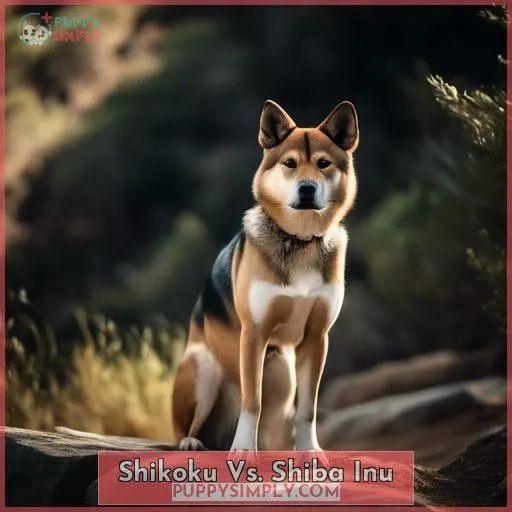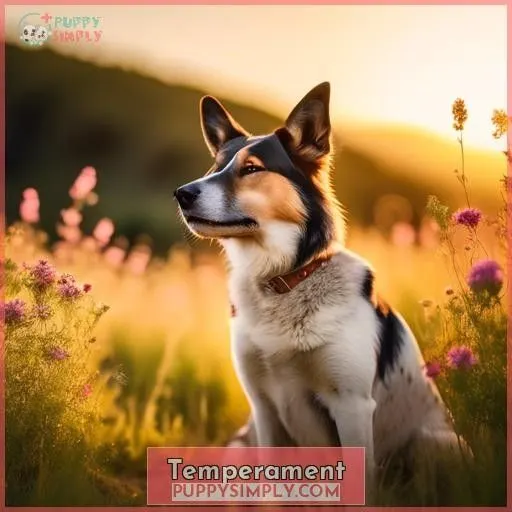This site is supported by our referee . We may earn a commission , at no cost to you , if you buy through link .
If you ’re seeking an well-informed , brave , and devoted familiar , theShikoku dogmight be the perfect fit ! This intermediate - sized spitz - type strain from Japan ’s craggy regions sports adistinctive fatheaded coat , pointed ears , and a short , curly tail .
Historically used for hunting wild boar , the Shikoku is now a beloved family favorite known for itsloyal and protective nature . However , this energetic breed want experienced owners who can supply ample practice session and former socialisation .
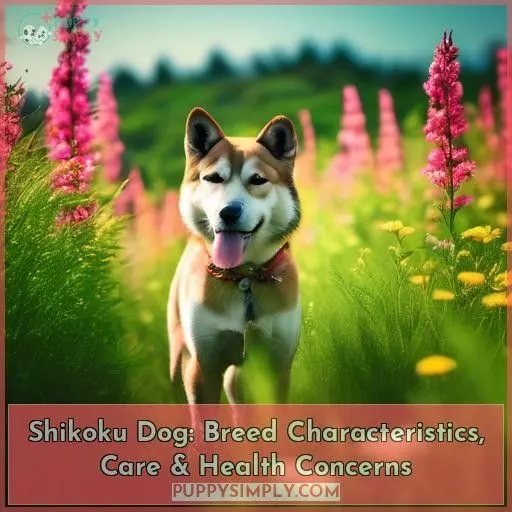
While not hypoallergenic , the Shikoku ’s striking coming into court and copious story make it an alluring selection for those seeking an active , devoted canine comrade .
Table Of Contents
Key Takeaways
Breed Characteristics
TheShikokuis a intermediate - sized spitz hot dog fromJapan , know for itsthick fur , pointed ears , and brusque , upwardly - curling tail . This stock was develop in the mountainous regions of Shikoku Island and was originally multiply to hunt wild boars . Shikokus areintelligent , brave , andprotective , make them excellent comrade for experient owners . They require consistenttraining and socializationto make them well - act and obedient .
Shikokus are n’t hypoallergenic , as they ’ve a thick pelage consisting of two layers with intermediate peeling throughout most of the year , along with a shedding season in which they drop undercoat pelt at much higher charge per unit . They ’re also prone to health result such as elbow joint , knee , or hip dysplasia , luxating patella , epilepsy , allergies , and fleshiness .
To make certain a levelheaded Shikoku , study familial health examination and crossbreeding with other stock to bring in novel genetic traits . Proper nutrition , regular exercise , and grooming are essential for their overall health and well - being . take or buy a Shikoku from a reputable breeder is commend , as they’rerareand may need traveling to reach a responsible for stock breeder in North America .
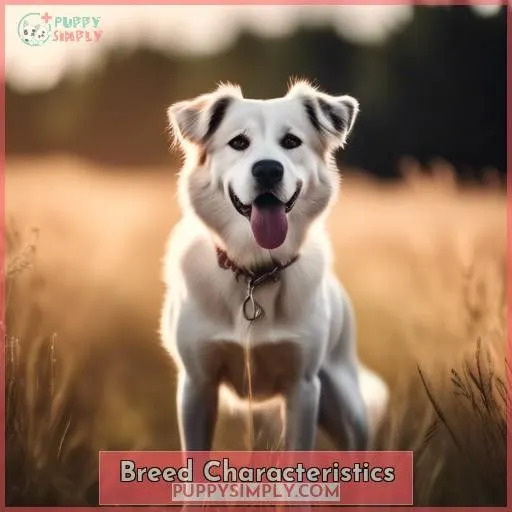
Origin and History
TheShikoku breedoriginated in the mountainous region ofShikoku Island , Japan , where it was principally used for hunting wild wild boar and other game . The strain ’s name , Shikoku , was chosen to honour its place of line of descent . TheShikoku Dogwas officially recognize by the Japanese Kennel Club ( JKC ) in 1937 and gained international recognition by theFédération Cynologique Internationale . Despite its popularity in Japan , the stock remains relatively rare outside of the country , with one-year registrations of 200 - 300 puppies in Japan and an estimated population of 4000 - 6000 dogs .
The Shikoku strain is part of theNihon Ken group , which includes other primitive breeds like theAkitaandShiba Inu . It ’s realize by various kennel clubs worldwide , include the American Kennel Club ( AKC ) through itsFoundation Stock Service . Although the stock is known for its commitment , intelligence , and assume appearance , it is n’t as well - known as some otherJapanese dog breeds , such as the Akita or Shiba Inu .
The Shikoku breed has a full-bodied chronicle rooted in the craggy area of Shikoku Island , where it was spawn for hunt enceinte game like boar and cervid . Its exceptional tracking ability , agility , and survival made it highly appreciate in the tough terrain of Shikoku . Over sentence , the stock ’s distinct characteristics and work power were cautiously preserved and complicate through selective breeding .
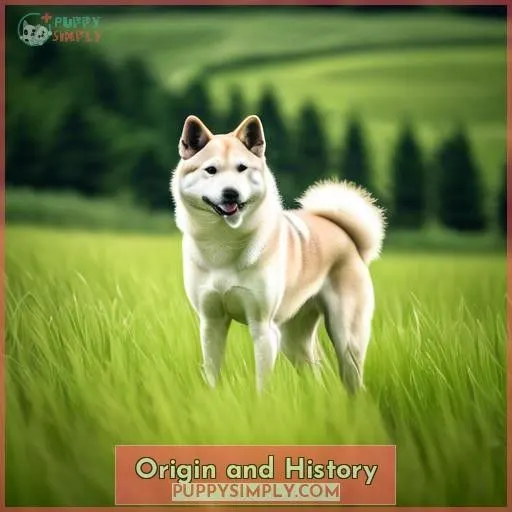
Care Requirements
As an active breed , the Shikoku take moderate daily exercise to quell physically and mentally fit . Its double coat need regular brushing to keep matting and keep it looking its good .
Exercise
As a devoted companion , your Shikoku will profit fromregular exerciseto maintain their moderate energy horizontal surface . Aim for at least30 minutes of day-to-day walks , and consider body process like lure coursing or agility to ply to theirhigh quarry thrust .
For puppies and senior , adjust recitation strength and frequence accordingly , control they receive the ripe amount of exercise for their age and health position .
Grooming
Your Shikoku ’s thick fur requiresregular brushingto prevent matting and maze . Desheddingis essential during seasonal sloughing , specially for those with hypoallergenic business .
The breed’sindependent naturemeans they may not always prize grooming , but short backside and pointed ears make it easier to turn over all areas .
think to keep their coat’shealth with a balanced dietand appropriate exercise .
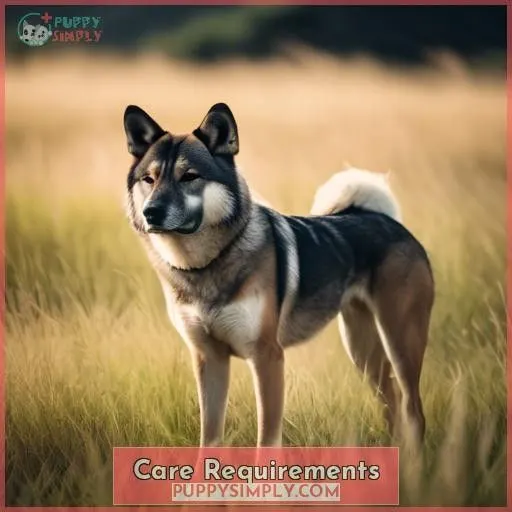
Training
discipline your Shikoku ask patience and body . Positive support methodswork well , sharpen on advantage rather than punishment . Socializationis essential for obeisance and addressing health problems like knee and elbow dysplasia . call back , red breeding is about building a strong bond with your furry friend .
Common Health Problems
Moving away from thespecialized careyour Shikoku requires , let ’s delve into the point of their wellness history . These sesame and dim and tan athletes may have a undestroyable life , but they are n’t exempt fromgenetic conditionssuch aship dysplasia , a frequent problem that hinders their apparent movement .
Unlike their relative , the Shiba Inu , they may also encounter the obstacle of aluxating patella . Bear in mind , timely action prevent complications , so regular check - ups and dental charge are your most in force strategies for assert the well - being of these energetic companion .
Diet and Nutrition
As a Shikoku owner , you ’ll want toprovide your furry friendwith a balanced diet that caters to their nutritional requirements . Here are four options tothink about :
Adoption and Purchase
When contemplating embracing or assume aShikoku , it ’s imperative to grasp their distinctive attribute and necessities . These canines areastute , athletic , andprotective , rendering them suitable forexperienced proprietorswho can distribute the needful breeding and socialization . They ’re most apropos for grownup sansyoung children or other favourite , as they own protective inclinations and may turn aggressive if not adequately trained .
Shikoku aren’thypoallergenic , so they may not be the optimal natural selection for those with allergies . They ’re also susceptible to certain wellness ill , such aship dysplasia , patellar luxation , and epilepsy . It ’s underlying to collaborate with a reputable stock breeder who can furnish information regarding the dog-iron ’s medical account and temperament testing .
Earlysocialization and trainingare paramount for Shikoku puppy , as they can be responsive and may exhibit a satisfying prey drive . They ’re most suited foractive individuals or familieswho can provide the necessary exercise and cognitive stimulation .

When seeking a Shikoku , consider visitingesteemed breederswithin the United States or importing from Japan . Be inclined for a considerable investment with heed to time and resource , as Shikoku demand coherent preparation and socialization .
Breed Overview
The Shikoku is a medium - sized breed with aunique appearance and temperament . brook at 17 to 22 inches tall and weighing between 35 and 55 pounds , the Shikoku is one of the gravid medium - sized Nihon Ken .
Its pelage is harsh , straight , and combined with a balmy , dense undercoat , typically in sesame , crimson benny , or bootleg sesame colors .
The Shikoku is known for itsintelligence , courageousness , and trueness , make it a great companion for those seek aprotective and athletic breed . Despite its independent nature , proper training can help it become a well - behaved and playful member of your family .

Shikoku Vs. Shiba Inu
TheShikokuandShiba Inuare two breed from the same family , but they have distinct conflict .
The Shikoku is larger , weighing 35 - 55 pounds , while the Shiba Inu is smaller , typically consider 17 - 23 pounds . The Shikoku has aboxier muzzleand a thicker , longer coat , while the Shiba Inu has afiner muzzleand a shorter , thinner coat .
Both strain areintelligent and loyal , but the Shikoku can be more independent and challenge to train . They deal some health concerns , such as hip joint dysplasia and epilepsy , but they are agnize by different dog house clubs .
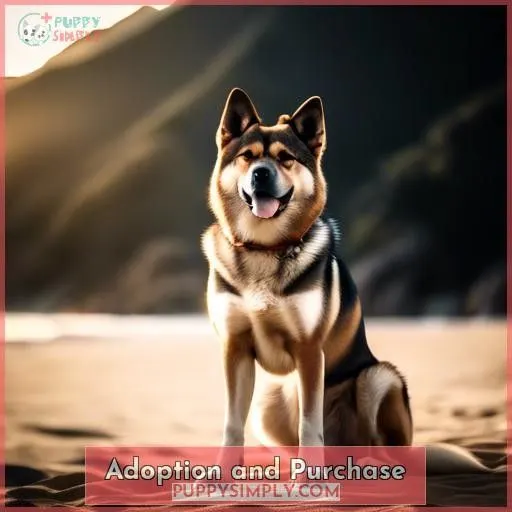
Temperament
dive into the temperament of the Shikoku , you ’re reckon at a breed that ’s the image of marching to the beat of their own drum . These dogs are :
In essence , own a Shikoku is like having a four - legged samurai at your side — brave , patriotic , but with a touch of stately remoteness .
Further Research
Further enquiry is all-important to embrace the Shikoku stock thoroughly , particularly regardinggenetic diseasesandtemperament variations . The Shikoku breed is renowned for itsallegiance , cleverness , and athletic prowess , but it also carries a bully risk of developingorthopedic issuesowing to its considerable size of it . genic screeningis advised to pinpoint specific ailments such as hyperuricosoria , degenerative myelopathy , and reform-minded pole - cone degeneracy .
diachronic preservation andpopulation developmentsare imperative in analyze the Shikoku stock . The breed possesses a rich inheritance in Japan , where it was in the first place bred for hunting and has received recognition from the Japanese Kennel Club and the Fédération Cynologique Internationale . Nevertheless , its scarceness , even within its homeland , pose challenges to studying and keep its genetic well - being .
International acclaim is also a pivotal element infurther inquiry . While the Shikoku lack recognition from theAmerican Kennel Club , it form part of theFoundation Stock Service , which seeks to facilitate its conservation . get the picture how the breed is perceived and prise in divers region of the cosmos can buckle under insights into its future saving andpotential wellness care .

Frequently Asked Questions (FAQs)
What is the best way to introduce a Shikoku to other dogs?
easy and cautiously , pup ! enter your Shikoku to other detent in aneutral territory , keeping them on ternary and let them sniff out the situation . Patience andpositive reinforcementare winder – do n’t coerce fundamental interaction . permit ’em warm up up at their own footstep .
How can I train a Shikoku to be less reactive towards people?
skin back the stoic outside , and you ’ll uncover a Shikoku ’s sensible soul . Steady exposure , confident support , and building cartel are the cay to help your pup peak into a positive , people - friendly companion . Stay patient – their loyalty is deserving the journey .
What is the ideal age to have a Shikoku fixed?
desexualise yourShikoku puparound 12 - 18 months is idealistic . Any in the first place and you risk stunt their growth . Wait too long and you could see boisterous behavior come out . metre it properly , and you ’ll have a patriotic , well - set associate for year to add up .
How can I prevent my Shikoku from becoming overweight?
Trim those delectable pounds , title-holder ! Dial up the daily walkies , swop kibble for lean meats , and keep those beg hand off the board scraps . Your regal Shikoku shape’ll stay sleek as a whistle if you put in the paw - study .
What are some common eye conditions that Shikoku are prone to?
As a proudShikoku parent , you ’ll want to keep an eye out for rough-cut eye issues like entropion and luxating patella . These can be a literal pain , but with quick treatment , your pup will be back on their secret plan in no time !
Conclusion
Admittedly , theShikoku dog‘s lush coating may require more preparation than some owners favour . However , this loyal and devotedJapanese breed‘s fertile history , striking appearance , and protective nature make it a really rewarding companion for the right category .
With ample exercise and other socialization , theShikoku dogcan flourish as an active , loving addition to your home .
If you ’re seeking a brave , level-headed Shikoku blackguard to call your own , this ancient spitz - type stock may be your perfect match .
